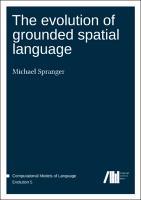The evolution of grounded spatial language
Author(s)
Spranger, Michael
Collection
Knowledge Unlatched (KU)Language
EnglishAbstract
This book presents groundbreaking robotic experiments on how and why spatial language evolves. It provides detailed explanations of the origins of spatial conceptualization strategies, spatial categories, landmark systems and spatial grammar by tracing the interplay of environmental conditions, communicative and cognitive pressures. The experiments discussed in this book go far beyond previous approaches in grounded language evolution. For the first time, agents can evolve not only particular lexical systems but also evolve complex conceptualization strategies underlying the emergence of category systems and compositional semantics. Moreover, many issues in cognitive science, ranging from perception and conceptualization to language processing, had to be dealt with to instantiate these experiments, so that this book contributes not only to the study of language evolution but to the investigation of the cognitive bases of spatial language as well.
Keywords
robotic experiments; spatial language; spatial grammar; Adjective; Adverb; Anatomical terms of location; Chinese grammar; Evolution; Frame of reference; Parsing; Preposition and postposition; Semantics; SyntaxDOI
10.26530/OAPEN_611695ISBN
9783946234159;9783944675466OCN
1030818999Publisher
Language Science PressPublisher website
https://langsci-press.org/Publication date and place
2016Grantor
Series
Computational Models of Language Evolution, 5Classification
Linguistics
Computing and Information Technology


 Download
Download Web Shop
Web Shop